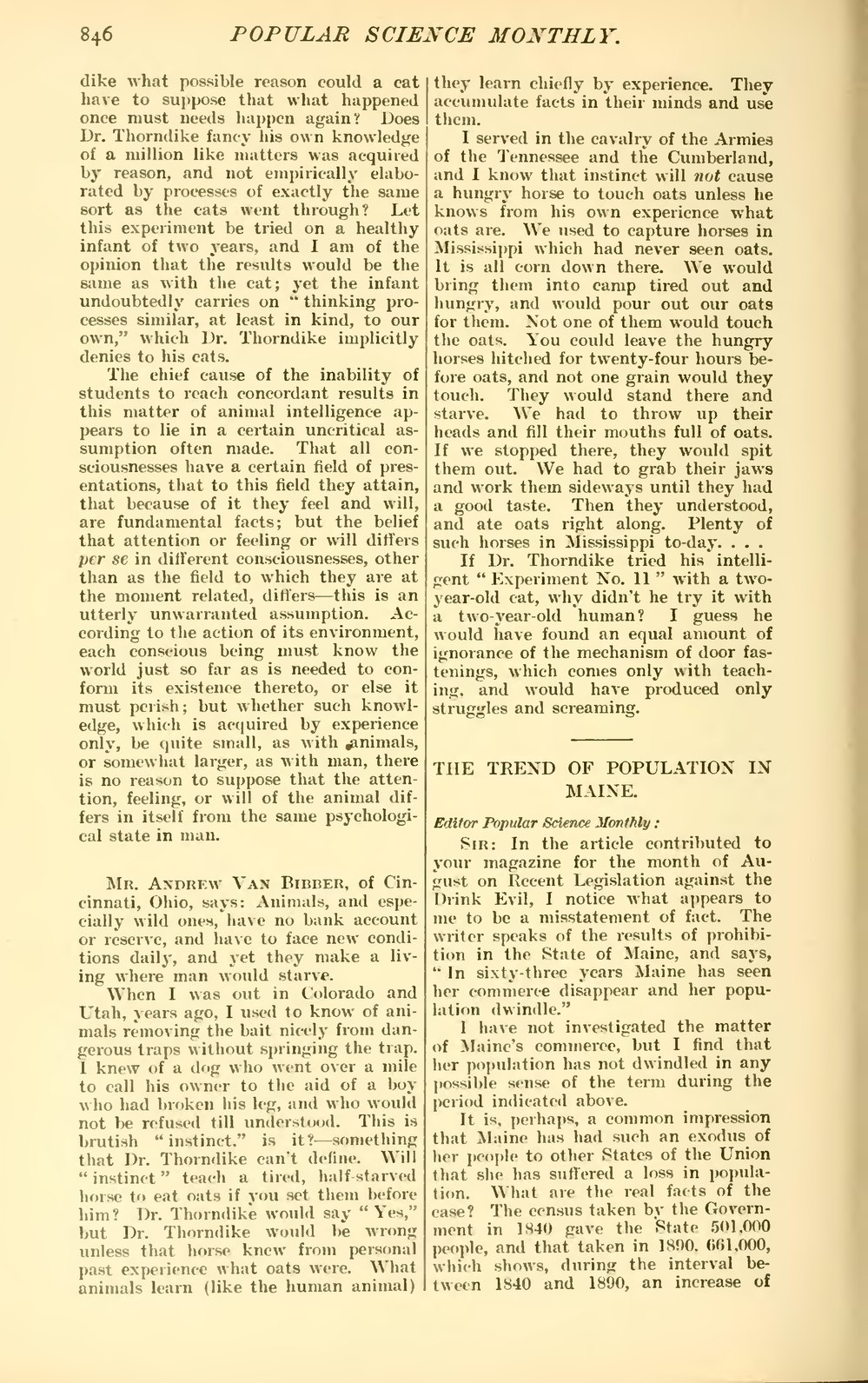dike what possible reason could a cat have to suppose that what happened once must needs happen again? Does Dr. Thorndike fancy his own knowledge of a million like matters was acquired by reason, and not empirically elaborated by processes of exactly the same sort as the cats went through? Let this experiment be tried on a healthy infant of two years, and I am of the opinion that the results would be the same as with the cat; yet the infant undoubtedly carries on "thinking processes similar, at least in kind, to our own," which Dr. Thorndike implicitly denies to his cats.
The chief cause of the inability of students to reach concordant results in this matter of animal intelligence appears to lie in a certain uncritical assumption often made. That all consciousnesses have a certain field of presentations, that to this field they attain, that because of it they feel and will, are fundamental facts; but the belief that attention or feeling or will differs per se in different consciousnesses, other than as the field to which they are at the moment related, differs—this is an utterly unwarranted assumption. According to the action of its environment, each conscious being must know the world just so far as is needed to conform its existence thereto, or else it must perish; but whether such knowledge, which is acquired by experience only, be quite small, as with animals, or somewhat larger, as with man, there is no reason to suppose that the attention, feeling, or will of the animal differs in itself from the same psychological state in man.
Mr. Andrew Van Bibber, of Cincinnati, Ohio, says: Animals, and especially wild ones, have no bank account or reserve, and have to face new conditions daily, and yet they make a living where man would starve.
When I was out in Colorado and Utah, years ago, I used to know of animals removing the bait nicely from dangerous traps without springing the trap. I knew of a dog who went over a mile to call his owner to the aid of a boy who had broken his leg, and who would not be refused till understood. This is brutish "instinct," is it?—something that Dr. Thorndike can't define. Will "instinct" teach a tired, half-starved horse to eat oats if you set them before him? Dr. Thorndike would say "Yes," but Dr. Thorndike would be wrong unless that horse knew from personal past experience what oats were. What animals learn (like the human animal) they learn chiefly by experience. They accumulate facts in their minds and use them.
I served in the cavalry of the Armies of the Tennessee and the Cumberland, and I know that instinct will not cause a hungry horse to touch oats unless he knows from his own experience what oats are. We used to capture horses in Mississippi which had never seen oats, it is all corn down there. We would bring them into camp tired out and hungry, and would pour out our oats for them. Not one of them would touch the oats. You could leave the hungry horses hitched for twenty-four hours before oats, and not one grain would they touch. They would stand there and starve. We had to throw up their heads and fill their mouths full of oats. If we stopped there, they would spit them out. We had to grab their jaws and work them sideways until they had a good taste. Then they understood, and ate oats right along. Plenty of such horses in Mississippi to-day.…
If Dr. Thorndike tried his intelligent "Experiment No. 11" with a two-year-old cat, why didn't he try it with a two-year-old human? I guess he would have found an equal amount of ignorance of the mechanism of door fastenings, which comes only with teaching, and would have produced only struggles and screaming.
THE TREND OF POPULATION IN MAINE.
Editor Popular Science Monthly:
Sir: In the article contributed to your magazine for the month of August on Recent Legislation against the Drink Evil, I notice what appears to me to be a misstatement of fact. The writer speaks of the results of prohibition in the State of Maine, and says, "In sixty-three years Maine has seen her commerce disappear and her population dwindle."
I have not investigated the matter of Maine's commerce, but I find that her population has not dwindled in any possible sense of the term during the period indicated above.
It is, perhaps, a common impression that Maine has had such an exodus of her people to other States of the Union that she has suffered a loss in population. What are the real facts of the case? The census taken by the Government in 1840 gave the State 501,000 people, and that taken in 1890, 601,000, which shows, during the interval between 1840 and 1890, an increase of

